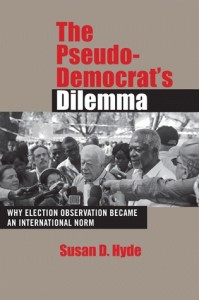ចាប់ច្រវាសម្លឹងត្រើយ on NEC reform
Op-Ed: Post Khmer
ចាប់ច្រវាសម្លឹងត្រើយ
មុននឹងចាប់ផ្តើមចែករំលែកនូវការយល់ឃើញខ្លះៗផ្ទាល់ខ្លួន ខ្ញុំសុំរំឭកមិត្តអ្នកអានទាំងអស់សូមចាំថា លទ្ធផលនៃកំណែទម្រង់ គ.ជ.ប កើតចេញពីការចរចាគ្នារវាងបក្សពីរ ដូចនេះ គ្មានអ្វីដាច់ខាត ហើយគ្មានអ្វីឥតខ្ចោះនោះទេ អ្វីៗមិនបានដូចចិត្តទាំងអស់នោះទេ។ សឹមៗកុំបំបោល ក្រែងមិនដល់ ដូចប្រាថ្នា។
ទី១. ផ្តើមចេញពីការថែមអាសនៈពី ១ ទៅ ៣ នៅមណ្ឌលកំពង់សោម។ សង្គ្រោះជាតិចង់បានពីរ តែប្រជាជនចង់បានបី។ ចង់ពីរមិនព្រម បើមិនយកបី មានតែអត់។ ការពិតបើនិយាយពីចំនួន គឺច្បាស់ជាចាញ់ប្រៀប បក្សប្រជាជន តែបើនិយាយពីនយោបាយ គឺសង្គ្រោះជាតិបានបោះមួយជំហាន ពីខេត្តដែលមិនអាចឈរជើងបាន ទៅជាបង្កើតបានជាបន្ទាយមួយសម្រាប់ឈរជើងហើយជាបន្ទាយសម្រាប់ខ្សែរាជវង្សចូលក្នុងនយោបាយជាតិផង។ ទីបំផុតទៅ អ្នកណា ២ អ្នកណា ១ នៅមិនទាន់ដឹងទេ។ នយោបាយដូចបាល់មូល។ នយោបាយមានពីរផ្លូវ ថាតើវាយពីក្រៅ ឬវាយពីខាងក្នុង។ កម្លាំងច្រើនវាយព័ទ្ធពីក្រៅ កម្លាំងតិចធ្វើសង្គ្រាមផ្ការីក។
ទី២. បើនិយាយពីការបោះឆ្នោត គេនិយាយពីចំណុចធំពីរ ថាតើសមាសភាព គ.ជ.ប ឯករាជ្យទេ អព្យាក្រឹតទេ ឬតុល្យភាពទេ ហើយការអនុវត្តការងាររបស់ គ.ជ.ប បានត្រឹមត្រូវតាមច្បាប់ទេ។ និយាយពីការអនុវត្តច្បាប់ បង្កើតច្បាប់ ត្រូវមើលមនុស្ស។ ជាការពិតសមាសភាព គ.ជ.ប ថ្មីនេះ មិនឯករាជ្យ មិនអព្យាក្រឹតទេ ព្រោះបញ្ជូនទៅពីបក្ស ៤ ទល់ ៤ មានតែអ្នក ទី៩ ទេ ដែលឯករាជ្យ តែប្រព័ន្ធនេះគឺមានតុល្យភាព រក្សានូវលំនឹងរវាងភាពត្រូវនិងខុស ដែលពីមុនគ្រប់គ្រងផ្តាច់មុខដោយបក្សតែមួយ ដូចនេះ គ.ជ.ប ថ្មីគឺប្រសើរជាងមុន ក្នុងការគ្រប់គ្រង ចាត់ចែង ដឹកនាំ សម្រេចចិត្ត។ បើបានចំណែកគ្រប់គ្រង គ.ជ.ប ហើយ ស្រាប់តែមានបក្សណា ចោលម្សៀតធ្វើមិនកើត ហៃអើតាមតែគេ ពេលនោះ ចាំកាប់ក៏មិនទាន់ហួសពេលដែរ។ គ្មានអ្នកណា ធ្វើអត្តឃាតខ្លួនឯងទេ មានតែមនុស្សឆ្កួត។
ទី៣. ការសម្រេចចិត្តជាទូទៅរបស់ គ.ជ.ប គឺប្រើប្រព័ន្ធឆ្នោត ៥០ ភាគរយ បូក ១ មានតែបទបញ្ជាផ្ទៃក្នុងរបស់ គ.ជ.ប ទេ ដែលតម្រូវឲ្យយកសំឡេងភាគច្រើន ដោយប្រៀប ២/៣។ បទបញ្ជាផ្ទៃក្នុង សម្រាប់ការធ្វើការងារជាប្រចាំថ្ងៃរបស់ គ.ជ.ប ត្រូវចេញពី ២/៣ តើមានអ្នកណាថា ការងារមិនដើរល្អ? បក្សប្រជាជន គឺប្រាកដជាទាមទារធ្វើជាប្រធាន គ.ជ.ប ចំណែកអនុប្រធាន គឺសង្គ្រោះជាតិ។ ក្នុងករណី ៤ ទល់ ៤ សំឡេងប្រធានមានឧត្តមានុភាព ដែលមានន័យថា មានអំណាចអាចសម្រេចចិត្តបាន។ អាចទៅកើត វាទាល់តែបុគ្គលឯករាជ្យម្នាក់ ទី៩ នោះ អនុបវាទ ឬត្រូវគេគំរាមសន្តិសុខ មិនអាចមកប្រជុំសម្រេចកិច្ចការសំខាន់ៗបាន ដូចនេះ ដើម្បីដោះស្រាយ បញ្ហានេះ សមាជិក គ.ជ.ប អាចស្នើសុំការការពារសន្តិសុខបាន ក្នុងករណីចាំបាច់។ អាចមានមតិលើកឡើងថា អាជ្ញាធរជារបស់រដ្ឋាភិបាល អ៊ីចឹងក្រែងលោកចុះទឹកក្រពើឡើងលើខ្លា។ ដូចនេះហើយបានអាទិភាពរបស់អ្នកនយោបាយគឺកំណែទម្រង់ស្ថាប័នជាតិធំៗ ដើម្បីជួយទប់គ្នា។




